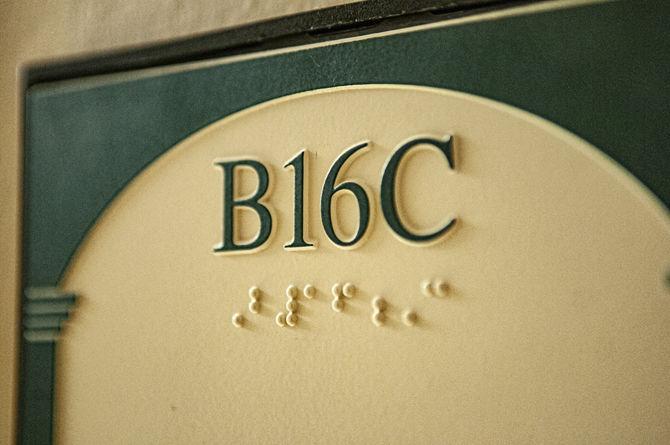When psychology junior Josh Price learned a committee at the University passed an initiative to implement Braille signage in a number of buildings in LSU’s Quad, he had one question: “Finally?”
Price is one of the few blind students enrolled at LSU, and he faces accessibility issues on campus every day. To Price, Student Government’s Braille initiative is a big step toward inclusion, but he said the fact that it just passed in September shows how little the university has done thus far to make LSU accessible to visually impaired students.
“I find myself relying on Student Government because I’ve seen them more concerned over disabled students than LSU administration is,” Price said.
Director of Disability Services for SG and political science and philosophy junior Kaitlyn McCaskill said her department is working to implement initiatives that directly improve the lives of students with disabilities.
Her assistant director and mass communication senior Lillie Thompson said the department reaches out to students via surveys to figure out which parts of campus need improvement. She said the Campus Access Site Team (CAST) works closely with the department to get ideas about how to make campus more accessible.
Thompson said she uses her position to make functional, practical changes around campus to support students with disabilities and integrate them more in student life. She said the department has shifted its view toward problems that face students with disabilities on a day-to-day basis.
“People can be very kind toward people with disabilities, but few people focus on giving them the experience they deserve on campus,” Thompson said. “That’s what we’re really trying to do. We’re the facilitators between students with disabilities and administration in terms of making LSU more livable, as it should be.”
McCaskill said her department’s focus is multifaceted, with programs in the works to support communities on campus like hard-of-hearing students, visually impaired students and students with cognitive disabilities.
Thompson said an American Sign Language interpreter recently gave the department a demonstration on commonly-used phrases, the alphabet in ASL and the importance of communicating with hard-of-hearing peers.
“It was a fantastic example of the little things every student can learn to make hard-of-hearing students feel more included in our community,” Thompson said.
In September, CAST approved the department’s Braille plating program to make older buildings on campus more accessible. Price said that as of November, without the buildings in the Quad have signage denoting their names. He said that if he doesn’t have a student escorting him to class, there’s no way for him to know which building he’s about to enter. He said he thinks this initiative should be the first of many of its kind.
In addition to putting up new signage, Price said the University needs to correct problems with current Braille plating in campus buildings.
“There’s a men’s bathroom in Coates Hall that reads ‘Men,’ but in Braille it says ‘Women,’” Price said. “That mess should be fixed as soon as possible.”
The department is also pushing for push-to-open buttons on buildings and a text-to-speak feature on the LSU Dining website that would help visually impaired students.
Thompson said the department is trying to reschedule a Disability Walk on campus that was canceled due to a hurricane. The department will invite disabled students to walk around campus with members of the department and administration to point out accessibility issues that the University can mitigate.
McCaskill said she and her department are working to implement a program at LSU that would offer students with cognitive disabilities alternative higher education options. The program would give students an opportunity to attend LSU for two years to receive a certificate in the major of their choice.
“We believe that this program would encourage students who wouldn’t attend four-year universities to continue their education,” McCaskill said. “I love all of our initiatives, but this one I am especially ready to bring to administration.”
McCaskill said she is set to meet with SG President Stone Cox in the upcoming weeks to discuss how SG can work with University administration to gain some traction on the idea.
There are no students with disabilities in the department, but Thompson said that she and the rest of the department make an effort to educate themselves on what aspects of campus life are like for people with disabilities.
“We really make an effort to educate ourselves and make ourselves more cognizant of the issues disabled communities face on campus,” Thompson said. “We have really wanted to be a well-rounded council because we don’t know everything, but we want to be the best equipped that we can be to serve the most students on campus.”








